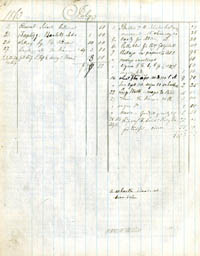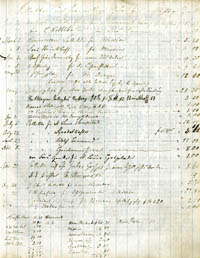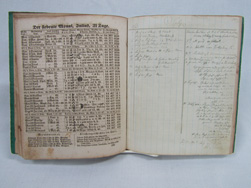July 3, 2013
Artifact: Missouri Synod Pastor’s Civil War Diary
Date: 1863 (open to July in photograph)
Significance: As much of the country is observing the 150th anniversary of the Battle of Gettysburg this week, we decided to take a look at one of the Civil War era items in the CHI collection. This is one of the diaries we have from Pastor Franz Julius Biltz who was a pastor in Concordia, Missouri, during the Civil War. Concordia’s location in western Missouri placed Biltz and his congregation squarely amid armed conflict between secessionists and Union troops that took several lives from the congregation. Biltz’s diaries shed light on the events happening during this time, both local and national. In the photograph, the diary is open to a page in July 1863 where he notes in the second column: “1-3 – Battle near Gettysburg”
 About Pastor Biltz: Franz Julius Biltz (b. 1825, d. 1908) was born in Saxony and immigrated as a young boy to America along with the Saxon Emigration Society in 1838ñ1839. He attended the log cabin college in Perry County. His first call following his seminary graduation in 1848 was to Dissen (Friedheim), Cape Girardeau County, Missouri. Six years later he was called to a congregation in Cumberland, Maryland, where he also served six years until being called in 1860 to Saint Paul Lutheran Church in Concordia, Lafayette County, Missouri. Biltz remained at Saint Paul until he retired due to failing health in 1901. During his forty-one years there, he served as president of the Western District from 1875 to 1891 and helped found Saint Paul’s College in Concordia, which still exists today as a Lutheran high school. Biltz married Marie von Wurmb, a former classmate in the log cabin, in 1849. The two had thirteen children together, only seven of whom lived to adulthood. Two of Biltz’s daughters married sons of the first two Missouri Synod presidents, C. F. W. Walther and F. C. D. Wyneken.
About Pastor Biltz: Franz Julius Biltz (b. 1825, d. 1908) was born in Saxony and immigrated as a young boy to America along with the Saxon Emigration Society in 1838ñ1839. He attended the log cabin college in Perry County. His first call following his seminary graduation in 1848 was to Dissen (Friedheim), Cape Girardeau County, Missouri. Six years later he was called to a congregation in Cumberland, Maryland, where he also served six years until being called in 1860 to Saint Paul Lutheran Church in Concordia, Lafayette County, Missouri. Biltz remained at Saint Paul until he retired due to failing health in 1901. During his forty-one years there, he served as president of the Western District from 1875 to 1891 and helped found Saint Paul’s College in Concordia, which still exists today as a Lutheran high school. Biltz married Marie von Wurmb, a former classmate in the log cabin, in 1849. The two had thirteen children together, only seven of whom lived to adulthood. Two of Biltz’s daughters married sons of the first two Missouri Synod presidents, C. F. W. Walther and F. C. D. Wyneken.
 About the July 1863 Diary Entries: In the left column Biltz noted letters he wrote to or received from various people and their dates. On the right column of page 15 is a chronological list, both local and national, of events that happened that month. At the top of this column he wrote: “Bushwhackers at F. & L. Stuenkel’s, stealing horses, clothing & money.” He does not list a date for this (appears to be prior to the 4th), but did note that the incident happened at nine o’clock at night. Also of a local nature is his note dated for July 4, which read: “all quiet – no festival.” Presumably, there was no Independence Day celebration in Concordia that year. Biltz then listed some national news including the Battle of Gettysburg on July 1-3, Vicksburg surrender on July 4 and Port Hudson surrender on July 9. Some of these dates are out of order with the local notations, but he most likely recorded the events whenever that national news reached him.
About the July 1863 Diary Entries: In the left column Biltz noted letters he wrote to or received from various people and their dates. On the right column of page 15 is a chronological list, both local and national, of events that happened that month. At the top of this column he wrote: “Bushwhackers at F. & L. Stuenkel’s, stealing horses, clothing & money.” He does not list a date for this (appears to be prior to the 4th), but did note that the incident happened at nine o’clock at night. Also of a local nature is his note dated for July 4, which read: “all quiet – no festival.” Presumably, there was no Independence Day celebration in Concordia that year. Biltz then listed some national news including the Battle of Gettysburg on July 1-3, Vicksburg surrender on July 4 and Port Hudson surrender on July 9. Some of these dates are out of order with the local notations, but he most likely recorded the events whenever that national news reached him.


On the back side (page 16) Biltz recorded his finances, with income in the left column and expenses on the right. Income that month included his salary, a funeral and two baptisms. Total income was $27.50. Expenses included butter, sugar, flour and other foodstuffs, along with candy for children, postage and cigars. He also had traveling expenses to St. Louis and Perry County. Total expenses were $100.55. In July he also included a listing of mission collections (page 17).
Visit the CHI Museum at the LCMS International Center in Kirkwood, Missouri, for more information about Rev. Biltz and to view other excerpts from his diaries that reveal some of the local conflicts that he and his members faced during the Civil War.



